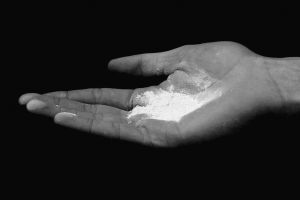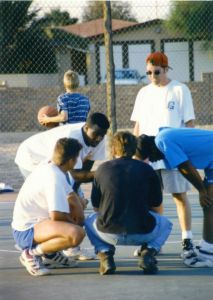 In Jacksonville possession of cocaine cases, the prosecutor will often attempt to enter into evidence the fact that the Jacksonville possession of cocaine defendant had a large amount of cash in his possession. Obviously, this highly prejudicial to the Jacksonville possession of cocaine defendant. When a defendant is alleged to have illegal drugs and large amounts of cash on his person, most juries will look at the defendant and see a drug dealer. Evidence of cash in a Jacksonville possession of cocaine case is irrelevant and should not be allowed. In mere Jacksonville possession of cocaine cases, the defendant is not alleged to have sold the cocaine. He is merely in possession of the cocaine. Therefore, the fact that he has a large amount of cash on his person has nothing to do with the possession of cocaine, and is irrelevant. To learn more about Jacksonville possession of cocaine evidence law, read Mosley v. State or contact a Jacksonville Possession of Cocaine Attorney.
In Jacksonville possession of cocaine cases, the prosecutor will often attempt to enter into evidence the fact that the Jacksonville possession of cocaine defendant had a large amount of cash in his possession. Obviously, this highly prejudicial to the Jacksonville possession of cocaine defendant. When a defendant is alleged to have illegal drugs and large amounts of cash on his person, most juries will look at the defendant and see a drug dealer. Evidence of cash in a Jacksonville possession of cocaine case is irrelevant and should not be allowed. In mere Jacksonville possession of cocaine cases, the defendant is not alleged to have sold the cocaine. He is merely in possession of the cocaine. Therefore, the fact that he has a large amount of cash on his person has nothing to do with the possession of cocaine, and is irrelevant. To learn more about Jacksonville possession of cocaine evidence law, read Mosley v. State or contact a Jacksonville Possession of Cocaine Attorney.
Dropping Jacksonville Juvenile Charges
Most people think that in order to get Jacksonville juvenile charges dropped, you have to be not guilty of the offense. Then, once the prosecutor discovers that you are not guilty, he will drop the charges. This is not true. A Jacksonville Juvenile Attorney will usually speak with the prosecutor before court and discuss other options. The Juvenile Justice Diversion Program is one of those options. Jacksonville Juvenile Justice Diversion Programs usually consist of an essay, letter of apology, and 40 hours of community service. Once the juvenile completes this program, his Jacksonville Juvenile charges will be dropped. This is beneficial to the juvenile’s criminal record.
St. John’s County Girls Arrested for Auto Burglary
 Three St. John’s County teenage girls were arrested for auto burglary. They are accused of breaking into cars in St. Augustine, Florida. In Florida, burglary to an automobile occurs when a person enters the motor vehicle with the intent to commit an offense inside of it. Many people believe that in order for a person to commit car burglary, you must “break” into the car. However, this is not the case. In Jacksonville and the surrounding areas, you only need to enter the car with criminal intent. Therefore, if the St. Augustine girls merely opened the car doors and took spare change, they committed burglary. To learn more about Jacksonville Burglary, visit www.jacksonvillelawyer.pro or contact a Jacksonville Burglary Attorney.
Three St. John’s County teenage girls were arrested for auto burglary. They are accused of breaking into cars in St. Augustine, Florida. In Florida, burglary to an automobile occurs when a person enters the motor vehicle with the intent to commit an offense inside of it. Many people believe that in order for a person to commit car burglary, you must “break” into the car. However, this is not the case. In Jacksonville and the surrounding areas, you only need to enter the car with criminal intent. Therefore, if the St. Augustine girls merely opened the car doors and took spare change, they committed burglary. To learn more about Jacksonville Burglary, visit www.jacksonvillelawyer.pro or contact a Jacksonville Burglary Attorney.
Jacksonville DUI Lawyer: Can DUI Be Enhanced to a Felony?
On December 30, 2008, in State of Florida v. Glenn Kelly, the Florida Supreme Court ruled that a prior misdemeanor Florida DUI conviction cannot be used to enhance a DUI from a misdemeanor to a felony. However, there are four elements that must be met for this DUI rule to apply.
- The prior Florida DUI offenses were punishable by more than six months in jail.
- The Florida DUI defendant was entitled to a court-appointed lawyer.
- A lawyer was not appointed.
- The Florida DUI defendant did not validly waive his right to a lawyer.
Jacksonville Murder Case Reversed
On June 21, 2007, Steven Montgomery was found guilty of second-degree murder in Jacksonville, Florida. Patrick McGuinness and I were the Jacksonville criminal attorneys assigned to the case at the Public Defender Office. The Jacksonville State Attorney’s Office was seeking a conviction for first-degree murder in this Jacksonville murder case which would result in a minimum mandatory sentence of life in prison. However, the jury found Montgomery guilty of second-degree murder instead. After the Jacksonville sentencing hearing, Montgomery was sentenced to 45 years in the Florida State Prison.
Jacksonville DUI Lawyer: Over the Limit, Under Arrest?
Mothers Against Drunk Driving (MADD) and police departments across the nation ran a nationwide campaign titled “Over the Limit, Under Arrest.” According to Florida’s Driving Under the Influence (DUI) laws, it is unlawful to drive a vehicle with a breath-alcohol level of 0.08 or higher. In Jacksonville, Florida, the legal “limit” that is referred to in the MADD campaign is a breath-alcohol level of 0.08. However, the phrase “Over the Limit, Under Arrest” is not true at all.
Jacksonville Juvenile Criminal Intervention
 We all make mistakes as juveniles. Sometimes, that juvenile mistake can lead to an arrest. Most Jacksonville Juvenile Lawyers and Prosecutors will agree that early intervention in Jacksonville juvenile cases is the best solution. In many Jacksonville juvenile cases, the defendant is not a repeat offender. Often, the juvenile is a first time offender that made a poor choice and is scared of the juvenile justice system. The best way for a Jacksonville Juvenile Lawyer to handle a juvenile case is to divert the case out of the courtroom and into a diversion program. Once the Jacksonville juvenile successfully completes the diversionary program, his charges will be dropped. This is beneficial to the Jacksonville juvenile for numerous reasons. First, the Jacksonville juvenile’s charges will be dropped, which is the best possible outcome in any case. Second, if the Jacksonville juvenile charges are dropped, he can petition the Florida Department of Law Enforcement to get his Florida record expunged.
We all make mistakes as juveniles. Sometimes, that juvenile mistake can lead to an arrest. Most Jacksonville Juvenile Lawyers and Prosecutors will agree that early intervention in Jacksonville juvenile cases is the best solution. In many Jacksonville juvenile cases, the defendant is not a repeat offender. Often, the juvenile is a first time offender that made a poor choice and is scared of the juvenile justice system. The best way for a Jacksonville Juvenile Lawyer to handle a juvenile case is to divert the case out of the courtroom and into a diversion program. Once the Jacksonville juvenile successfully completes the diversionary program, his charges will be dropped. This is beneficial to the Jacksonville juvenile for numerous reasons. First, the Jacksonville juvenile’s charges will be dropped, which is the best possible outcome in any case. Second, if the Jacksonville juvenile charges are dropped, he can petition the Florida Department of Law Enforcement to get his Florida record expunged.
Jacksonville Judge Declares Mistrial for Vesey Murder Case
Jacksonville Judge, John Merrett, after nine days of trial, declared a mistrial in the David Vesey murder case yesterday due to juror misconduct. A Jacksonville juror conducted research on her own about the “shaken baby” murder case. The case will be retried.
Jacksonville Couple Arrested for Grand Theft of Puppy
- Taber had a conscious intent that the Jacksonville Grand Theft be committed, and
- Taber did something to assist or encourage Cunningham to commit the Jacksonville Grand Theft.





